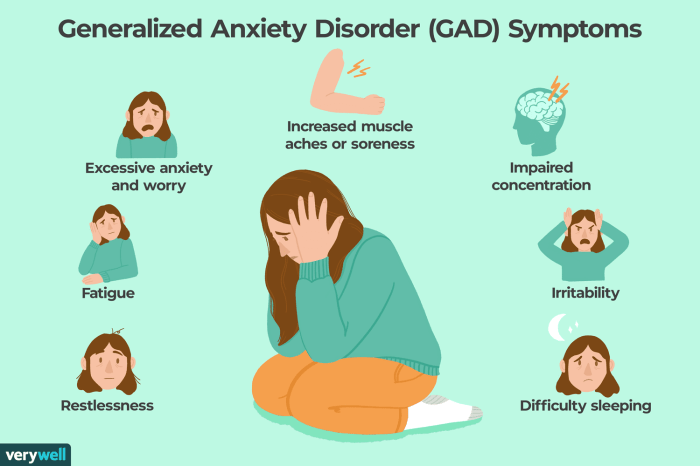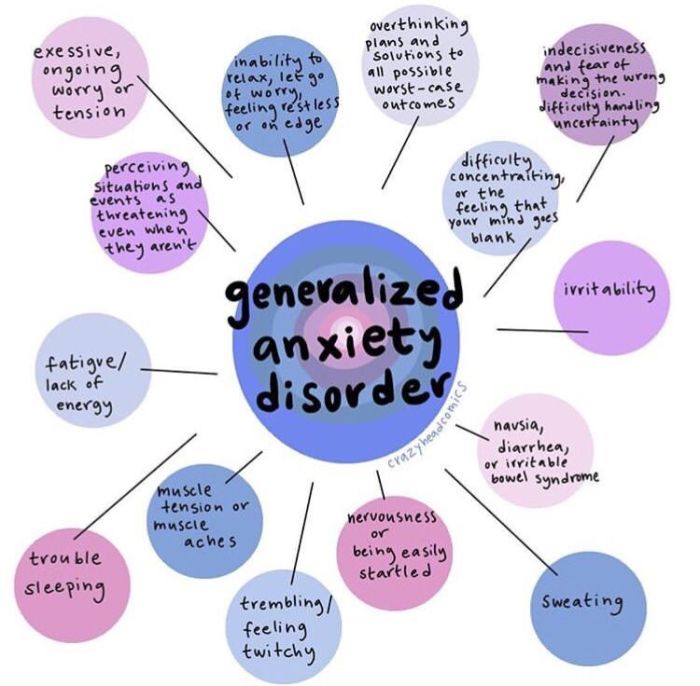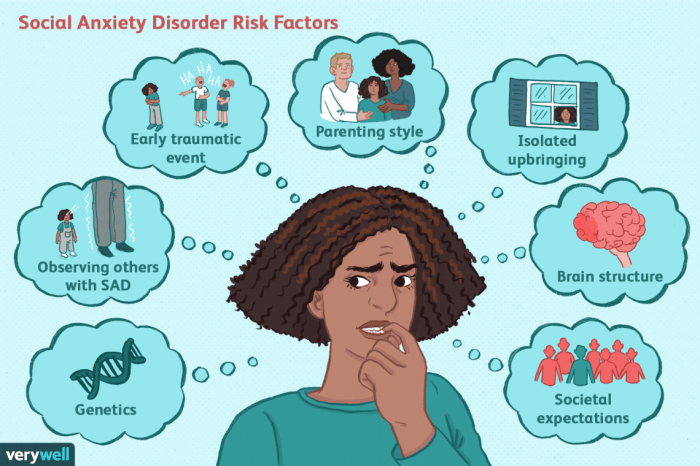Identify a true statement about generalized anxiety disorder – Generalized Anxiety Disorder (GAD) is a prevalent mental health condition characterized by excessive and persistent worry. Identifying a true statement about GAD is crucial for understanding its nature, impact, and effective management. This article delves into a specific true statement about GAD, exploring its significance and implications for individuals and healthcare professionals.
Generalized Anxiety Disorder (GAD)
Generalized anxiety disorder (GAD) is a common mental health condition characterized by excessive, uncontrollable worry and anxiety. It is a chronic condition that can significantly impact an individual’s daily life, relationships, and overall well-being.
GAD is distinguished from normal anxiety by its persistence, intensity, and interference with daily functioning. Individuals with GAD experience excessive worry about a wide range of topics, including work, finances, health, relationships, and the future.
The symptoms of GAD can vary in severity and may include:
- Excessive worry that is difficult to control
- Restlessness or feeling on edge
- Muscle tension or fatigue
- Difficulty sleeping
- Irritability
- Difficulty concentrating
- Physical symptoms, such as headaches, stomach aches, or nausea
GAD can be triggered by various factors, including:
- Life stressors, such as work, relationships, or financial problems
- Personality traits, such as perfectionism or neuroticism
- Genetic factors
- Medical conditions, such as thyroid problems or chronic pain
GAD is a highly prevalent condition, affecting approximately 6.8% of the US population in any given year. It is more common in women than in men and typically begins in early adulthood.
GAD can have a significant impact on an individual’s life, including:
- Impaired work performance
- Relationship problems
- Social isolation
- Increased risk of depression and other mental health conditions
- Reduced quality of life
True Statement about GAD

One true statement about GAD is that it is a chronic condition that can be managed but not cured.
This statement is significant because it emphasizes the importance of ongoing treatment and management strategies for individuals with GAD. GAD is a persistent condition that requires consistent effort to manage symptoms and prevent relapse.
For individuals with GAD, understanding that their condition is chronic can help them develop realistic expectations and avoid frustration when symptoms arise. It can also motivate them to seek ongoing support and treatment to maintain their well-being.
For healthcare professionals, recognizing the chronic nature of GAD is essential for providing appropriate care. It allows them to develop long-term treatment plans that focus on symptom management, relapse prevention, and improving overall quality of life.
Treatment Options for GAD

There are various evidence-based treatments available for GAD, including therapy, medication, and lifestyle modifications.
Cognitive-behavioral therapy (CBT) is a type of psychotherapy that has been shown to be effective in reducing symptoms of GAD. CBT helps individuals identify and change negative thought patterns and behaviors that contribute to their anxiety.
Medication can also be an effective treatment option for GAD. Selective serotonin reuptake inhibitors (SSRIs) and serotonin-norepinephrine reuptake inhibitors (SNRIs) are commonly prescribed medications for GAD.
Lifestyle modifications can also play a significant role in managing GAD. Regular exercise, a healthy diet, and sufficient sleep can help reduce anxiety symptoms.
The effectiveness of different treatment approaches can vary depending on the individual and the severity of their symptoms. It is important to work with a healthcare professional to determine the most appropriate treatment plan.
Self-management strategies can also be helpful in managing GAD. These strategies include relaxation techniques, such as deep breathing exercises or meditation, and problem-solving skills to address stressful situations.
Differential Diagnosis and Comorbidities
GAD can be difficult to diagnose, as its symptoms may overlap with other mental health conditions.
Conditions that may mimic or co-occur with GAD include:
- Depression
- Panic disorder
- Obsessive-compulsive disorder (OCD)
- Post-traumatic stress disorder (PTSD)
Comorbidities are common in individuals with GAD. Approximately 50% of individuals with GAD also have a depressive disorder, and 20% have a substance use disorder.
The presence of comorbidities can complicate treatment and worsen the prognosis for individuals with GAD. It is important to conduct a thorough assessment to identify any co-occurring conditions and develop an appropriate treatment plan.
Prevention and Management: Identify A True Statement About Generalized Anxiety Disorder

There are no specific strategies to prevent the development of GAD. However, early intervention and proactive management can help reduce the severity and impact of symptoms.
Individuals who experience persistent anxiety or worry should seek professional help. Early diagnosis and treatment can help prevent the condition from becoming chronic or disabling.
Ongoing management of GAD is crucial for maintaining well-being. This includes regular therapy, medication adherence, and the implementation of self-management strategies.
Support groups and community resources can provide additional support and coping mechanisms for individuals with GAD. Self-care practices, such as regular exercise, healthy eating, and sufficient sleep, can also contribute to managing symptoms.
Answers to Common Questions
What is the most common symptom of GAD?
Excessive and persistent worry about a variety of topics is the hallmark symptom of GAD.
Is GAD a serious condition?
Yes, GAD can significantly impact an individual’s quality of life, impairing daily functioning, relationships, and overall well-being.